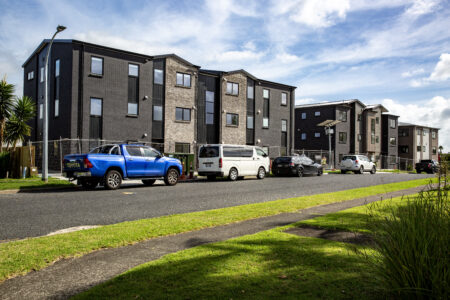
A Government agency that’s attracted controversy in east Auckland has been found to be underperforming and not financially viable without major changes being made.
The findings of an independent review into public housing agency Kainga Ora – formerly known as Housing NZ – led by former Prime Minister Sir Bill English were publicly released this week.
Botany MP and Prime Minister Christopher Luxon held a press conference with Housing Minister Chris Bishop to discuss the review’s findings and explain what action the Government is taking as a result.
The agency has assets of $45 billion, more than $2.5b of expenditure each year, owns over 70,000 homes and is New Zealand’s biggest landlord, Bishop says.
“Over the past six years, even while billions of dollars were poured into it by the previous Government, Kainga Ora left thousands of social houses sitting vacant, tenants were left to rack up enormous rent arrears, and threatening, abusive tenants were permitted to continue living in Kainga Ora homes despite the terror they inflicted on their neighbours.
“And despite all this, the waiting list for a social house quadrupled.”
He says the incoming Government had “significant concerns” about the agency’s financial performance and governance.
They’ve been borne out by the independent review, which makes two broad findings.
“First, Kainga Ora is underperforming and not financially viable without significant savings as well as funding and financing changes,” Bishop says.
“Second, the wider social housing system is not delivering the results New Zealand needs, and is lacking in transparency and accountability, coupled with a poor understanding of tenant outcomes.
“The review makes it clear Kainga Ora’s financial situation is very worrying.
“The operating deficit at the time the review was undertaken was forecast to grow from $520 million in 2022/23 to over $700m in 2026/27, driven by interest on the debt-financed capital investment programme.
“Debt is forecast to increase to $23b. Kainga Ora’s forecast cash requirement from the Crown is $21.4b over the next four years.”

The review also raised issues about Kainga Ora’s governance, Bishop says.
Seven major recommendations have been made, with Cabinet agreeing to four of them initially.
They are to align contractual arrangements across Kainga Ora and community housing providers, refresh its board, issue it with simplified direction, and that ministers set an expectation the board develop a credible and detailed plan to improve financial performance with the goal of eliminating losses.
Another change is that experienced business leader Simon Moutter has been appointed chair of Kainga Ora from June 4.
A refreshed board is expected to soon be in place at the agency also.
Kainga Ora is the agency that provides public housing to people on the Ministry of Social Development’s housing register.
Several large Kainga Ora housing developments in east Auckland were met with a frosty reception from locals last year.
The agency redeveloped multiple sites in Pakuranga including in Carole Crescent, Tiaka Place, Edgewater Drive, Cardiff Road, Opal Avenue and Aurea Avenue.
It was planning to replace 13 existing homes with 38 new homes.
News of the development sparked discussion on social media, with some people expressing concern about new public housing being built in the area.
Other commenters said it was a positive development, the majority of such tenants are good neighbours, and it’s unfair to judge them all because of the poor behaviour of a few.
During last year also more than 640 people signed a petition opposing a large Kainga Ora development in Huntington Park.
The building in Guys Road was later torched in an arson attack but has since been repaired.
Local residents were forming an action group to oppose the development and looked into taking legal action also.
The group was concerned about what it felt was a lack of consultation by Kainga Ora, increased traffic, and sunlight being blocked to neighbouring houses due to the height of the development.











